Queen Elizabeth II and Prince Philip: Their Love Story
Updated: Feb. 20, 2023
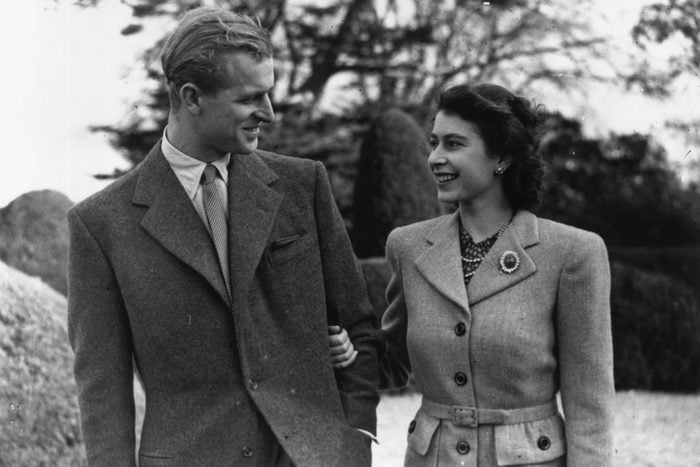
The romance of Queen Elizabeth and Prince Philip spanned decades. Find out how they met, fell in love, and built a life together for over 70 years.
“Although it’s a time of great happiness and good cheer for many, Christmas can be hard for those who have lost loved ones,” said Her Majesty Queen Elizabeth II, at the start of her annual Christmas speech on December 25, 2021. “This year, especially, I understand why.” That’s because she was in mourning for her beloved husband of more than 73 years, Prince Philip, Duke of Edinburgh, who passed away on April 9, 2021 at the age of 99.
Recalling the “mischievous, enquiring twinkle in her late husband’s eyes,” as well as his “sense of service, intellectual curiosity, and capacity to squeeze fun out of any situation,” Queen Elizabeth’s sweet tribute to her “strength and stay,” as she had referred to Prince Philip in another Christmas speech some 20 years ago, had many listeners in tears. It wasn’t just that the Queen was calling to mind some of the traits for which Philip was most beloved, not just by her, but by the general public; or that her recognition of the challenges of celebrating a holiday while mourning was so very relatable and poignant. Perhaps the deeper wrench was the fact that Philip’s death marked the end of an era so for many who have no real memory of a world in which Queen Elizabeth and Prince Philip were not at the top of this royal family tree. Here is the incredible story behind the fairy tale romance between Queen Elizabeth and Prince Philip.
Queen Elizabeth and Prince Philip’s first meeting
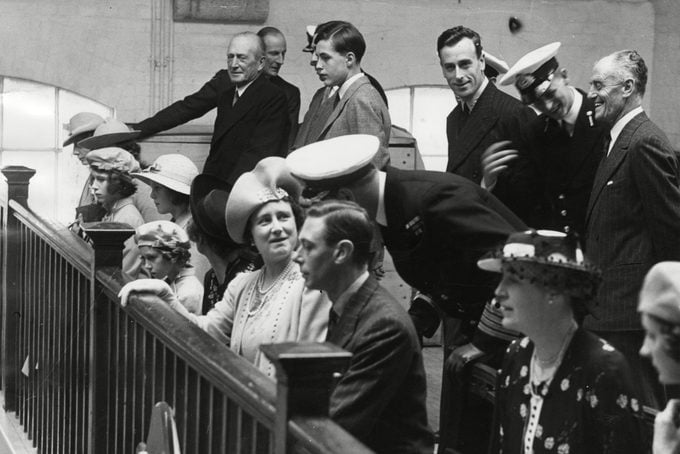
Queen Elizabeth and Prince Philip met for the first time in 1934 at the wedding of Prince George, Duke of Kent and Princess Marina of Greece and Denmark. The eight-year-old Princess Elizabeth of York, as she was known at the time, was first cousin to the groom, while 13-year-old Philip had two family ties to this particular royal wedding: cousin to the bride and the groom.
On the bride’s side, both Philip’s and Marina’s fathers were sons of King George of Greece. As for the groom, Philip and George of Kent were second cousins once-removed, both having descended from the same set of great-great-grandparents, Queen Victoria and Prince Albert. This means that, yes, Queen Elizabeth and Prince Philip were cousins.
Queen Elizabeth and Prince Philip’s courtship
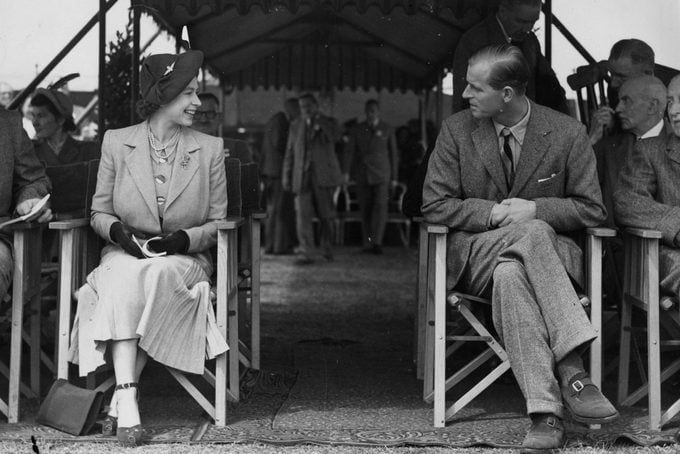
It was only a matter of happenstance that Princess Elizabeth and Prince Philip met again in July 1939. Elizabeth, now 13, was visiting the Royal Naval College in Dartmouth, Devon with her parents and sister. Philip, 18, a student at the school, was pulled in to be their tour guide after the two cadets who were originally assigned to the honors contracted mumps.
By all accounts, young Elizabeth was immediately smitten and followed the chance meeting up with a letter to Philip. He responded, and that lead to a lengthy correspondence between the two that would continue all throughout World War II, during which Philip was serving in the British Royal Navy. Elizabeth was soon keeping a framed photo of the handsome prince on her nightstand.
In 1943, Philip accepted an invitation to be Elizabeth’s guest at the royal family’s Christmas celebration at Windsor. During the celebration, Elizabeth performed in a pantomime version of Aladdin, and those who were present observed the signs of a romance blossoming between her and Philip. Now, when the prince went about his wartime travels, it was with a picture of Princess Elizabeth in his pocket.
Queen Elizabeth and Prince Philip’s engagement
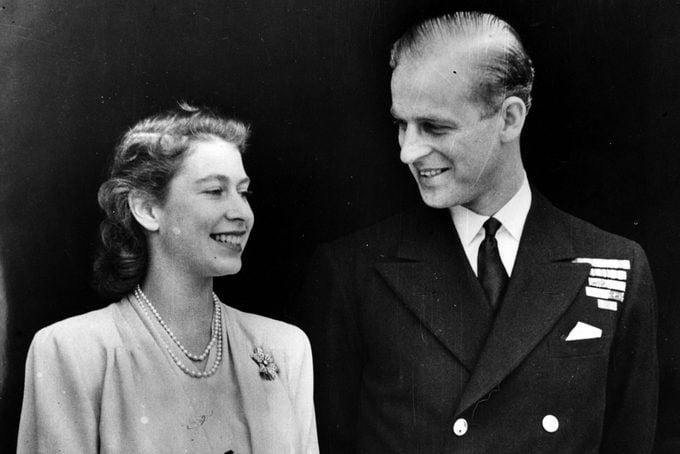
By 1946, Philip, now something of a war hero, asked for Elizabeth’s hand in marriage; he asked Elizabeth before seeking the permission of her father, King George VI, a breach of protocol. Nevertheless, and despite Philip’s relative lack of wealth, King George VI essentially blessed the proposed union, although he did ask that the couple wait until Elizabeth had turned 21 before making their engagement official.
Elizabeth and Philip officially announced their engagement to the public on July 9, 1947, three months after Elizabeth’s 21st birthday. The engagement ring was made from diamonds that had once been part of a tiara worn by Philip’s mother, Princess Alice of Battenberg.
Queen Elizabeth and Prince Philip’s wedding
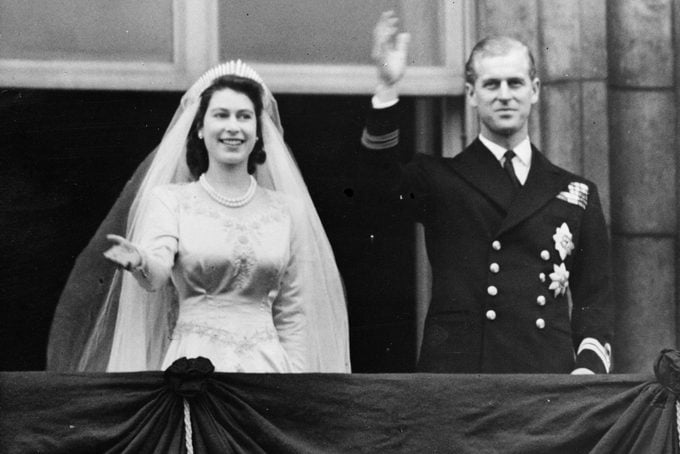
The wedding of Princess Elizabeth to Prince Philip took place on November 20, 1947, at Westminster Abbey. As a prerequisite, Philip was made to renounce the princely titles to which he had been born, become a British citizen, adopt the surname, Mountbatten (an anglicisation of the German “Battenberg,” the name associated with his mother), and become a confirmed member of the Church of England. While that was undoubtedly a lot, Prince Philip was rewarded not only with the hand of his beloved but also with the titles, “Duke of Edinburgh, Earl of Merioneth and Baron Greenwich,” which George VI bestowed upon Philip just prior to the wedding.
The wedding, to which 2,000 were invited, was the first royal wedding ever to be broadcast live over BBC Radio, and the first to have highlights televised. Philip’s best man was his cousin, David Mountbatten. Elizabeth, who had eight bridesmaids, wore a gown designed by Sir Norman Hartnell and the Queen Mary fringe tiara. The four-tiered wedding cake, which stood nine feet high, used ingredients from all around the world.
Queen Elizabeth and Prince Philip’s marriage: the early years
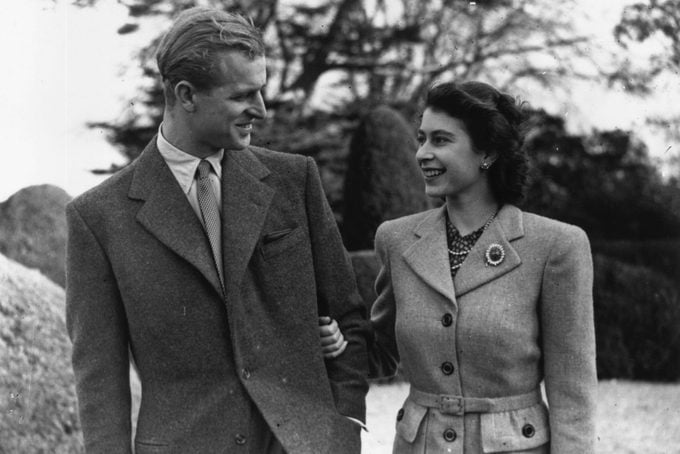
From the start, Elizabeth and Philip’s marriage showed great promise for a lifelong happy union. While on their honeymoon in the English countryside, Elizabeth wrote to her parents of their deep connection, and she referred to Philip as an “angel.” Within one year, on November 13, 1948, the couple’s first child, Prince Charles, was born, followed by Princess Anne in 1950. Then, a major change happened in the happy couple’s life.
On February 6, 1952, King George VI died at age 56 after a long illness, and Elizabeth became queen at the age of 27. British Parliamentary law prevented Prince Phillip from ever becoming king, and in what some see as something of a break with tradition, the queen did not give the title of Prince Consort to Philip. However, in 1957, she did something even more groundbreaking: she bestowed the title of “Prince of the United Kingdom” on Philip via letters patent.
Queen Elizabeth and Prince Philip’s children
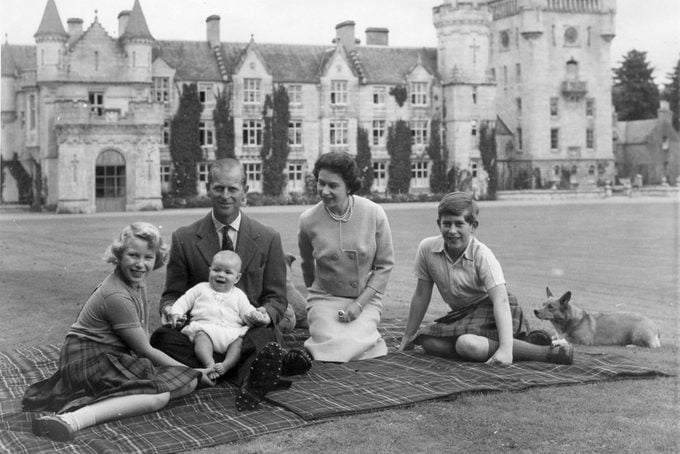
After Prince Charles and Princess Anne, Queen Elizabeth and Prince Philip welcomed Prince Andrew on February 19, 1960, followed by Prince Edward on March 10, 1964. Philip was, by many accounts, very attached to his children and took an active role in their upbringing. All four of Queen Elizabeth and Prince Philip’s children ultimately married. To date, Queen Elizabeth has eight grandchildren and 12 great-grandchildren.
Queen Elizabeth and Prince Philip’s marriage: a model of tolerance and support
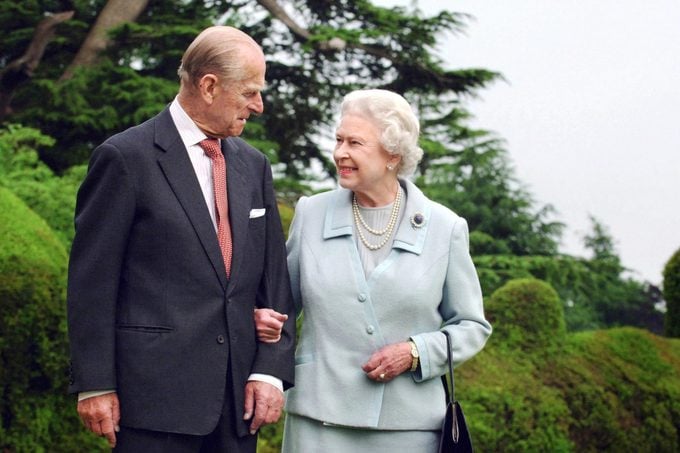
At the time of Prince Philip’s death in April 2021, he and Queen Elizabeth had been married for 73 years and 139 days. That makes their marriage the longest royal marriage in the history of the British monarchy. Like all marriages that endure for the long haul, Elizabeth and Philip’s union was not without its rough patches, especially as the two adjusted to life as young parents with the added stressor of serving as Queen and royal consort.
For one, despite his knowing exactly what he was going to be getting into when he decided to marry Elizabeth, Philip was reportedly miffed that he couldn’t give his name to his own children, when he learned that his children would not have his family name, “Mountbatten.”
Like all celebrity marriages, that of the queen and Philip endured occasional rumors of infidelity. For the most part, Philip was the one implicated, and his supposed affair partners included suspense novelist, Daphne du Maurier, and the ballerina, Galina Ulanova. (Philip’s infidelities are one of a number of facts Netflix’s The Crown has taken liberties with).
Whether the rumored affairs happened or not, Queen Elizabeth and Prince Philip’s marriage endured, prospered, and nurtured a lush, multi-branched family tree that currently spans four generations and counting. On the occasion of the 50th anniversary of their wedding in 1997, Philp famously observed that “the main lesson that we have learned is that tolerance is the one essential ingredient of any happy marriage,” and noted, “you can take it from me that the Queen has the quality of tolerance in abundance.”
Prince Philip’s death
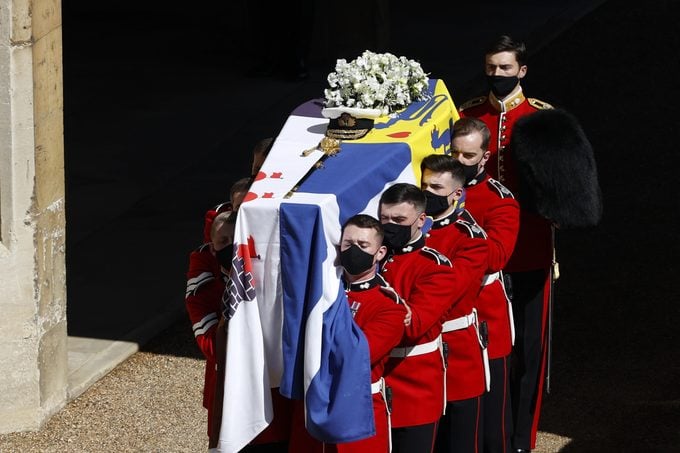
On April 9, 2021, Buckingham Palace announced that Prince Philip had died. “His Royal Highness passed away peacefully this morning at Windsor Castle,” the Palace circular informed a crushed global audience.” The Prince, the oldest living monarch’s spouse in British history, was just two months shy of his 100th birthday. The marriage, itself, which lasted more than 70 years, is the longest in British royal history, and among the most successful, with the two always managing to maintain a “united front,” and demonstrating affection for one another right up until the end.
Sources:
- Royal.uk: “The Duke of Edinburgh”
- Prince Philip Revealed by Ingrid Seward
- Royal.uk: “70 Facts About The Queen’s Wedding”
